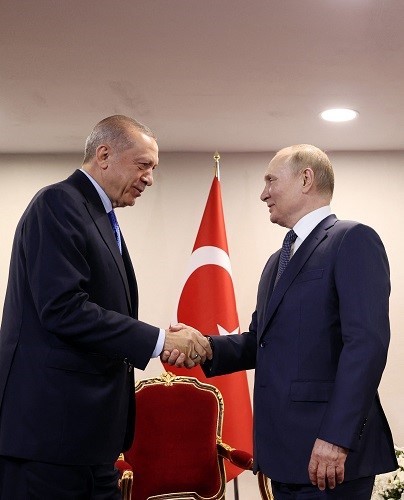TEHRAN — Russian President
Vladimir Putin arrived in Tehran for talks Tuesday on the Syrian war at a
three-way summit overshadowed by fallout from his country’s war on Ukraine.
اضافة اعلان
Putin traveled abroad for only the second time since ordering the
invasion of Ukraine in order to attend the gathering that also involves Turkish
President Recep Tayyip Erdogan.
 Turkish President Recep Tayyip Erdogan (left) shaking hand with Russian President Vladimir Putin during a meeting as part of the Astana Trilateral Summit at the Tehran International Conference Hall in Tehran. (Photo: Turkish Presidential Press Service/AFP)
Turkish President Recep Tayyip Erdogan (left) shaking hand with Russian President Vladimir Putin during a meeting as part of the Astana Trilateral Summit at the Tehran International Conference Hall in Tehran. (Photo: Turkish Presidential Press Service/AFP)
The summit comes days after US President Joe Biden visited the
Middle East for the first time in his presidency, with stops in Iran’s regional
foes Israel and Saudi Arabia.
It is the first hosted by Iran’s ultra-conservative president
Ebrahim Raisi since he took office last year and is ostensibly aimed at ending
more than 11 years of conflict in Syria.
All three are involved in the conflict, with Iran and Russia supporting
Syria’s President Bashar Al-Assad and Turkey backing rebel forces.
Ahead of the trilateral meeting, Iran’s supreme leader Ayatollah
Ali Khamenei met Erdogan, who has repeatedly threatened to launch a new
military offensive against Kurdish militants in northern Syria.
Khamenei warned the Turkish leader that such a move would be
“detrimental” for the region and called for the issue to be resolved through
dialogue between Ankara,
Damascus, Moscow, and Tehran.
Erdogan, speaking later at a joint news conference with his
Iranian counterpart, said Kurdish militias caused “great trouble” for both Iran
and Turkey.
“We should fight against these terrorist organizations in
solidarity and alliance,” he added.
The presidents also oversaw the signing of a number of agreements
in different fields, including in trade and economy.
Ukraine grain
Erdogan has for months been
offering to meet Putin in a bid to help resolve heightened global tensions.
“The timing of this summit is not a coincidence,” Russian analyst
Vladimir Sotnikov said.
“Turkey wants to conduct a ‘special operation’ in Syria just as
Russia is implementing a ‘special operation’ in Ukraine.”
Turkey has launched waves of attacks on Syria since 2016,
targeting Kurdish militias as well as Daesh extremists and Assad loyalists.
Russia’s war on
Ukraine has massively hampered shipments from one
of the world’s biggest exporters of wheat and other grain, sparking fears of
global food shortages.
However, Russian President Vladimir Putin thanked Turkish
President Recep Tayyip Erdogan for mediating talks on the export of grain from
Ukraine, saying there was some progress after the meeting.
“I want to thank you for your mediation efforts,” Putin told
Erdogan during a meeting in Tehran in comments released by the Kremlin.
“With your mediation, we have moved forward,” Putin said. “Not all
issues have yet been resolved, but the fact that there is movement is already
good.”
Putin also said there were “a lot of questions” on war-torn Syria
that needed to be addressed.
He also said that the Nagorno-Karabakh crisis, which is at the
center of a territorial dispute between arch foes Armenia and Azerbaijan, was
another “important” issue to discuss.
‘Iran-phobia’
On Sunday, a day after
Biden ended his tour of the Middle East, Iran accused the US of provoking
crises in the region.
Biden had vowed the US would not “tolerate efforts by any country
to dominate another in the region through military buildups, incursions, and/or
threats”, in reference to Iran.
In a speech at a Saudi summit of
Gulf Arab states as well as
Egypt, Jordan, and Iraq, Biden assured those gathered that the US would remain
fully engaged in the Middle East.
“We will not walk away and leave a vacuum to be filled by China,
Russia, or Iran,” he said.
Following the meeting, a joint statement committed the leaders to
“preserve regional security and stability”.
It also underscored diplomatic efforts to prevent Iran from
developing a nuclear weapon, a goal the Islamic republic has always denied
seeking.
On Sunday, Iran accused the US of having “once again resorted to
the failed policy of Iran-phobia, trying to create tensions and crises in the
region”.
The US
last week alleged Iran plans to deliver “hundreds of drones” to Russia to aid
its war on Ukraine, an accusation the Islamic republic dismissed as “baseless”.
Read more Region and World
Jordan News



